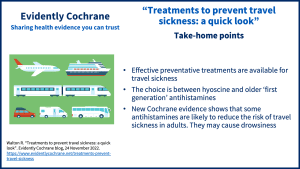In this short blog, Dr Robert Walton looks at the evidence on treatments to prevent travel sickness (motion sickness).
Take-home points
The new evidence on antihistamines comes from the Cochrane Review Antihistamines for motion sickness (published in October 2022) and is relevant to adults.
Travel sickness (motion sickness) is a common problem, and many people experience nausea for example on boats, planes or in the car. Lots of treatments which aim to prevent travel sickness are available to buy in UK pharmacies, including medicines. Here is the evidence on these medicines and some things you may want to think about when making your choices.
Making a choice? Think BRAIN!
It can be helpful to think BRAIN: What are the Benefits, Risks, Alternatives, what do I want and what if I do Nothing? These can be good questions to talk about with a health professional when making a health decision.
Medicines to prevent travel sickness
The choice is between hyoscine (or scopolamine as it is sometimes called) and antihistamines such as cinnarizine.
Most of the Cochrane evidenceCochrane Reviews are systematic reviews. In systematic reviews we search for and summarize studies that answer a specific research question (e.g. is paracetamol effective and safe for treating back pain?). The studies are identified, assessed, and summarized by using a systematic and predefined approach. They inform recommendations for healthcare and research. is focused on hyoscine which is probably better than placeboAn intervention that appears to be the same as that which is being assessed but does not have the active component. For example, a placebo could be a tablet made of sugar, compared with a tablet containing a medicine. (dummy treatmentSomething done with the aim of improving health or relieving suffering. For example, medicines, surgery, psychological and physical therapies, diet and exercise changes.) at preventing travel sickness. It comes from the Cochrane Review Scopolamine (hyoscine) for preventing and treating motion sickness (published June 2011).
The new Cochrane evidence about antihistamines, from the Cochrane Review Antihistamines for motion sickness (published October 2022) finds that they are likely to reduce the riskA way of expressing the chance of an event taking place, expressed as the number of events divided by the total number of observations or people. It can be stated as ‘the chance of falling were one in four’ (1/4 = 25%). This measure is good no matter the incidence of events i.e. common or infrequent. of travel sickness in adults who tend to get it, compared with taking a placebo.
It’s worth bearing in mind that there is evidence to support using older or ‘first generation’ antihistamines but none for the newer medicines such as loratadine and cetirizine which are more commonly used now for hay fever now. These newer antihistamines are not used to prevent or treat motion sickness and are unlikely to be effective.
There are few studies comparing the two types of medicines. There is little information about whether either are useful for treating motion sickness after it has started so prevention may be better than cure.
What are the risks?
Hyoscine and antihistamines both work in the same way for preventing travel sickness and they also share the same side effects which include drowsiness in some people.
What are the other options?
Many other options are available but there is no Cochrane evidence about their potential benefits and harms.
What do I want?
What matters (most) to you, and past experiences of a problem – and of treatments, is important when making treatment choices. If you usually get travel sickness and want to prevent it then there are medicines that can help and are backed up by Cochrane evidence. But it may be important to you to avoid the risk of side effects (such as drowsiness, if you have to drive for example). You could discuss your options and experience of treatments with a pharmacist.
What if I do nothing?
Travel sickness is usually not usually a big problem although some people can be quite severely affected. If you have had it once in a particular situation then you are likely to get it again.
Find out more
The Cochrane ReviewsCochrane Reviews are systematic reviews. In systematic reviews we search for and summarize studies that answer a specific research question (e.g. is paracetamol effective and safe for treating back pain?). The studies are identified, assessed, and summarized by using a systematic and predefined approach. They inform recommendations for healthcare and research.:
Karrim N, Byrne R, Magula N, Saman Y. Antihistamines for motion sickness. Cochrane Database of Systematic ReviewsIn systematic reviews we search for and summarize studies that answer a specific research question (e.g. is paracetamol effective and safe for treating back pain?). The studies are identified, assessed, and summarized by using a systematic and predefined approach. They inform recommendations for healthcare and research. 2022, Issue 10. Art. No.: CD012715. DOI: 10.1002/14651858.CD012715.pub2.
Spinks A, Wasiak J. Scopolamine (hyoscine) for preventing and treating motion sickness. Cochrane Database of Systematic Reviews 2011, Issue 6. Art. No.: CD002851. DOI: 10.1002/14651858.CD002851.pub4.
Why you can trust this information
Join in the conversation on Twitter with @CochraneUK @rtwalton123 or leave a comment on the blog.
Please note, we cannot give specific medical advice and do not publish comments that link to individual pages requesting donations or to commercial sites, or appear to endorse commercial products. We welcome diverse views and encourage discussion but we ask that comments are respectful and reserve the right to not publish any we consider offensive. Cochrane UK does not fact-check – or endorse – readers’ comments, including any treatments mentioned.
Robert Walton has nothing to disclose.




Dr. Walton, thank you for sharing your review. For children and those children with epilepsy, I have looked at their sensory processing to help prevent some of their motion sickness. There is a book “Understanding your Child’s Sensory Signals” by Angie Voss, OTR that helps families. I can also share with you my poster from the British Paediatric Neurology Association event in 2020 titled ” What are the perspectives and understanding of healthcare professionals including occupational therapists on treatment and care of babies with infantile spasms and early onset epilepsy- A qualitative design” if I have your email address.